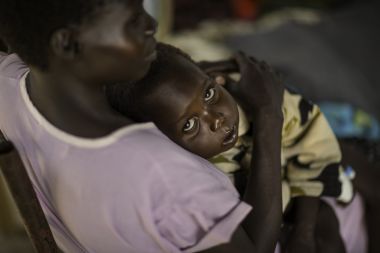South Sudan: Peace talks stall amid 'worst food crisis in the world'

South Sudan's government and opposition forces failed to meet the deadline for peace talks this weekend, amid an escalating food crisis.
The Intergovernmental Authority on Development (IAGD), the regional bloc that is overseeing the talks in the Ethiopian capital, Addis Ababa, set a deadline of August 10 to form a transitional government.
The conflict began in December 2013 when President Salva Kiir accused his former deputy, Riek Machar, of an attempted coup.
Kiir became president when the country gained independence from Sudan in 2011. In July 2013 he dismissed Riek as his vice-president along with the entire cabinet, following an ongoing power struggle.
The President is attempting to retain control of the Sudan People's Liberation Movement, the former rebel group which now leads the country, although Machar has threatened to challenge him for the leadership.
But what started as political friction has become an ethnic conflict. Kiir belongs to the largest ethnic group in South Sudan, the Dinka, and Machar from the second largest community, the Nuer.
Ethnically motivated attacks were seen on a large scale in Bentiu in April, when 200 people were killed at a mosque, church and hospital in which the rebels targeted all non-Nuer.
There have been repeated attempts at a peace agreement. A truce agreed in January broke down shortly after. A cessation of hostilities was then signed in May, although violent clashes have continued.
The talks stalled last week when the rebel leader allegedly boycotted the negotiations. Chief negotiator Dhieu Mathok Diing Wol blamed IGAD for delays in the peace process, and said in an interview with RFI that the parties would be better off without their mediation.
Thousands have been killed and an estimated 1.5 million people have been displaced by the conflict.
In July the United National Security Council said that South Sudan's food crisis was the worst in the world, with an estimated 4 million people facing food insecurity.
Food shortages have been exacerbated by the conflict, since displaced farmers have been unable to plant their crops. With the end of the rainy season approaching, the shortages are only set to get worse in the coming months. Those living in United Nations camps are already entirely dependent on international food aid.
"People are very fearful – they're traumatised, and the culture of violence is very strong," said Christine Allen, Christian Aid's director of policy and public affairs, who has recently returned from South Sudan.
While it is described as an ethnic conflict, Allen said that church leaders have been trying to make sure that those divisions don't become ingrained, particularly since Dinkas and Nuers have traditionally lived together peacefully.
"They say 'This is not Rwanda'. Within that, the churches are the only credible place – it's the only credible political space, as there isn't much confidence in political leaders, but they're also the only physical space where people can come together."
Consequently, church leaders have a unique role to play. "One displaced bishop said his congregation had been dispersed, they don't have vestments or books, the body of Christ has been brutalised... and yet they are coming back to a deep spirituality that says they have to work for peace," Allen said.
"There's a challenge for the international community to remember South Sudan in the midst of almost apocalyptic situations elsewhere in the world," she added.The UN fears that there will be a shortfall in aid needed to manage the food crisis, since it has only received $42 million of the $108 million it has appealed for.
Christian development agency Tearfund is seeing increasing numbers of children coming to its feeding centres in Jonglei state with acute malnutrition – children who are too sick to join the feeding programme and require immediate medical care.
Last year one feeding centre saw 27 referrals for malnutrition, but they have already made 45 referrals since the end of May this year.
South Sudan's fledgling economy has also been stymied by the violence. Work has slowed on the oil fields, South Sudan's greatest income source, and oil production is now half what it was at the time of independence.
The economy was already struggling before the conflict and was a source of tension within the leading party. Austerity measures restricted expenditure, and there was frustration that much of it was spend on government and military salaries.
Much development within South Sudan since independence has focussed on the capital, Juba and many rural areas have been neglected.











